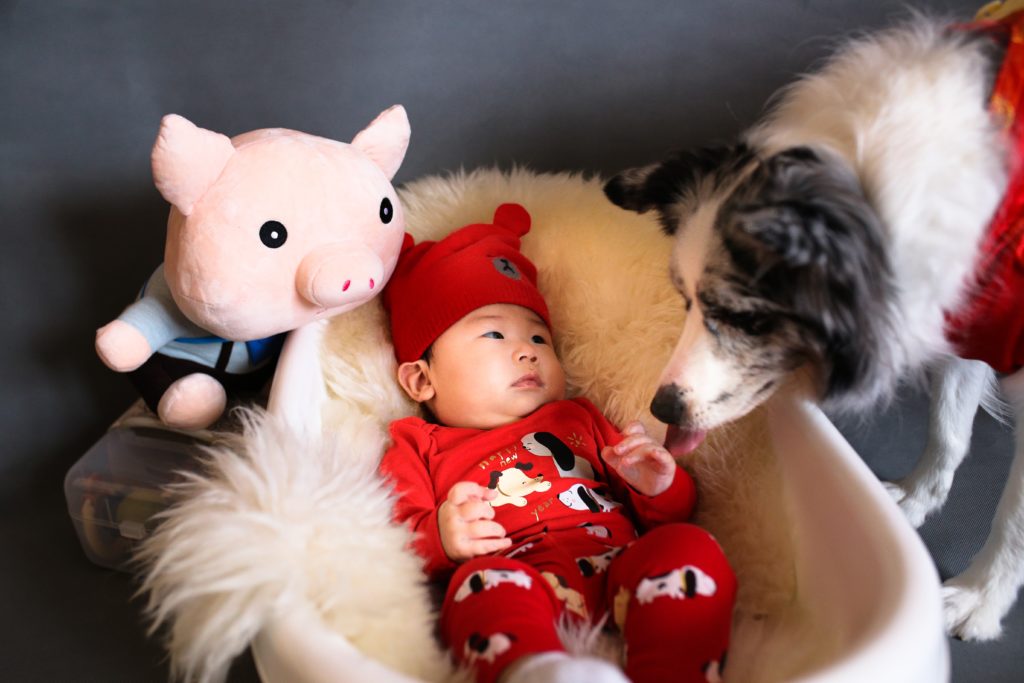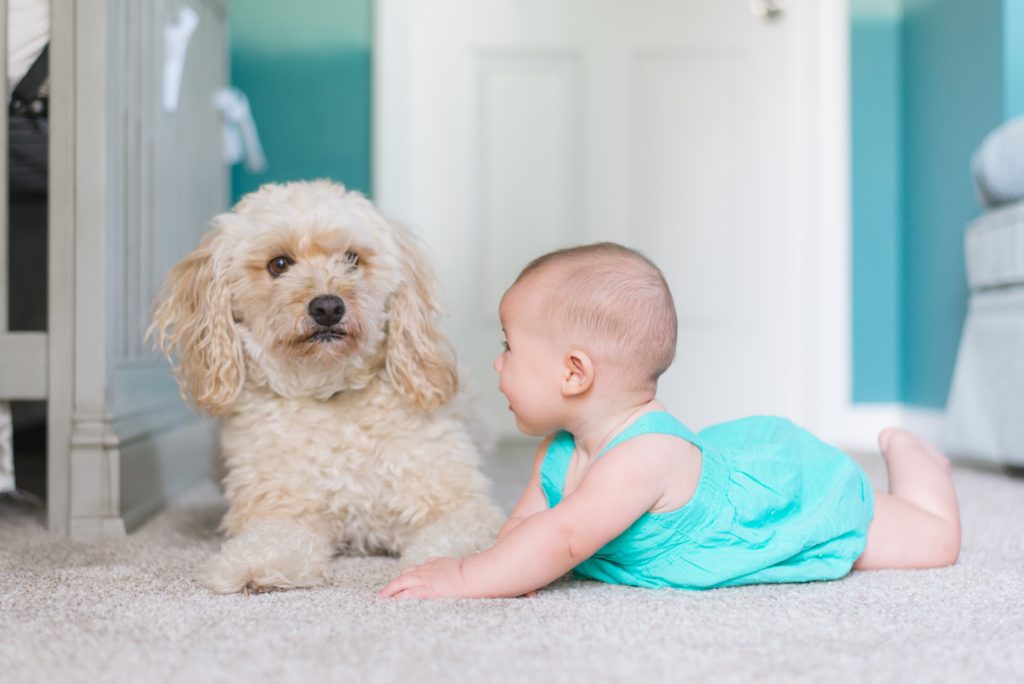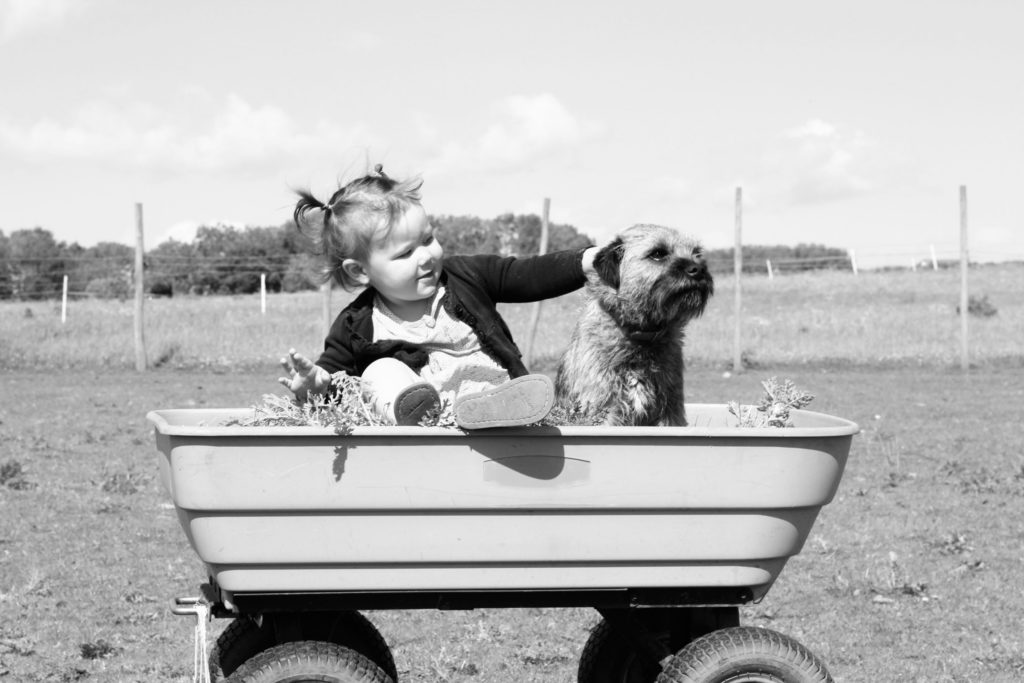
Are you a new mom worried about how your furry friend is taking the new living situation? Or maybe you are expecting and concerned about your dog’s reaction when you take your newborn home with you. Are you wondering how the relationship between Dogs and Babies evolves?
There is no need to put your four-legged friend up for adoption. Dogs and babies can live harmoniously!
The Connection Between Dogs and Babies

Photo by Minnie Zhou on Unsplash
Dogs are man’s best friend, and babies can form strong ties with our canine friends. These animals are very endearing. They understand how humans feel and can highly adapt to them and respond to our emotional needs accordingly.
Dogs and babies are inclined to each other. Both like to lounge around all day and are excited to have a constant playmate who will shower them with attention.
Having a dog at home will be beneficial for your little one’s development. Dogs can stimulate a child’s psychological and physical progress. Not to mention, dogs can make your child happy. Interaction with your favorite animal boosts serotonin and dopamine, the happy hormones. And, why not? Dogs are amazing pets. One hug and everything seems alright with the world again.
Of course, while it seems like a given that your dog and your baby will get along, it does not mean you should not do anything about it. Preparing your canine friend will make her be better equipped with handling the baby as soon as he gets home.
How To Prepare Your Dog When A Baby Is On The Way
When The Pregnancy Kit Screams Positive
Once you know that you will be having a baby, take your pooch to a basic obedience class. Harmless behavior that you think is adorable can actually be bad for you while you are toward the end of your pregnancy. Also, imagine having your pooch jump at you when you are with your newborn. That’s a recipe for disaster.
A lot of dogs have not experienced being with kids. Pooches do not know what babies are like. Little humans have no concept of boundaries and can invade your dog’s personal space. They also do some unexpected things abruptly that might catch your dog off guard. Take your dog to the park and observe how she is with the kids there. Maybe ask your friend with a toddler or a young kid to go with you and your pooch for a walk. In this manner, your dog will get used to the feeling of having a kid nearby.
Months Before Your Due Date
Three Months
Be more keen on preparing your pup for her new playmate. Introduce your dogs to the scents like baby lotion, perfume, and powder. Expose your dog to your baby’s things such as the crib, changing station, and other things. When taking a stroll with your dog, put her on a leash. Never tie the strap to your future baby’s stroller. If he suddenly chases something or gets excited, she might drag the stroller, along with your baby, with her! Thus, for a safe relationship between dogs and babies, it is better to be prepared.
One Month
Figure out who will take care of your dog. Choose a sitter and make sure he or she understands what the terms are. It is crucial to let them know that one of these days the baby will come, and your little one will not announce himself which time of the day it will be. Ask them to prepare, in case the baby comes in the wee hours. You probably already have a person in mind, but choose a backup person for good measure. If you are up to it, you can take your dog to a daycare for a month.
Arriving With The Baby
Giving birth, be it via cesarean or natural method, means that you were at the hospital for quite some time. Your furry friend is probably over-eager to see you. When you enter the house, make sure your husband is the one holding the baby. Say “hi” to your dog. Acknowledge her excitement and once she has calmed down a bit, introduce the baby to her.
Introducing Your Dog To Your Baby
Step 1: Sit on a chair, baby on your lap, across from your dog. Ask your husband to restrain the dog gently. Cover your baby’s head with your free hand. This small action will have an impact on your dog. She will understand that the new arrival is supposed to be protected.
Step 2: When your dog draws closer, talk to her in a calm and soothing voice. Pet her to reassure her.
Step 3: If your dog remains calm and unperturbed, let her approach to see and sniff the baby out. Be wary of any signs of aggressiveness such as growling. Also, do not let her lick the baby because it is unhygienic and might lead to biting.
Step 4: At all times, make sure that your canine friend is secured in place by a leash. Tell your husband to pull her back. Although there might not be a need to do so because it is likely that the minute your dog acts out, your husband’s first instinct will be to get your furball out of there.
When your dog expresses anxiety and does something weird, give her a firm “no” and ask her to back down. Even if everything went according to plan, it is still important to keep her on a leash during the first month.
Form A Relationship Between Your Dog and Your Baby

Sometimes, a dog may feel out of place or cannot fully understand how her living situation suddenly changed. Avoid reprimanding and constantly being strict with your dog during this period. You might be a bit high-strung these days, but know that the adjustment period is also hard for your dog, especially since it is difficult for her to comprehend what is happening.
- Instead of getting mad when he misbehaves, try shifting her behavior by re-introducing her to things that make her happy, like a chew toy. Play fetch with her and reward her with treats afterward. Also, make sure your dog is getting the right supplements to ensure that she is in excellent condition all the time.
- When doing baby-related tasks, such as diaper changing, have your dog join you. She can sit down in a corner while you converse with her and your baby. In this way, your dog feels included and responsible.
- Do not forget to shower your dog with attention and love when you are taking care of your baby. For example, give your dog a treat while you are bottle-feeding or nursing the baby This can prevent your dog from developing jealous feelings for your baby.
- Always be there when they interact. Sudden wailing of your child can startle the dog, causing her to act up. Observe for signs of discomfort whenever they are together.
- Do not forget to take your pet for a walk. Otherwise, she might channel her saved-up energy by doing crazy things, like digging, raiding the trash can, or just simply being all over the place.
As Your Baby Grows Older

Photo by Amy Treasure on Unsplash
In time, your child will start learning how to get by on his own. When he starts to crawl ensure that there is a proper space for him to do so. When he starts walking, keep the dog at a distance. As a beginner, there is a high chance your child will stagger and fall down several times. Dogs might get reactive and do something unexpected.
Since you are trying to forge a two-way relationship, teach him how to respect your dog once your baby has a higher level of understanding. Demonstrate how to properly handle a pet, including the right way of stroking. Teach them that it is not good to do specific actions like poking his canine friend’s eyes or ears, or pulling the fur, and so on.
Reiterate the importance of respecting personal space. Make sure your child can pick up what territory means.
When your baby is already a capable toddler, ask for his help in taking care of your pooch.
Final Thoughts
Establishing a relationship between your child and your pet can take a while. Do not rush into it. Otherwise, both parties might feel distressed when forced. Be patient. Soon enough, your baby and your pooch will be cuddling happily on the floor.
Leave a Reply